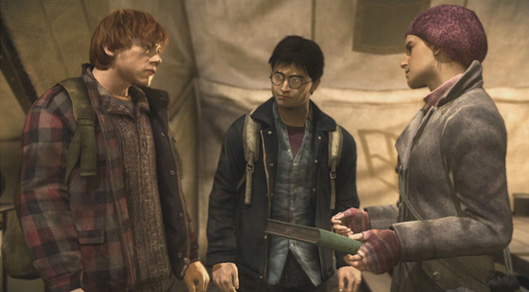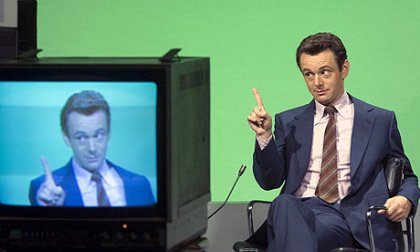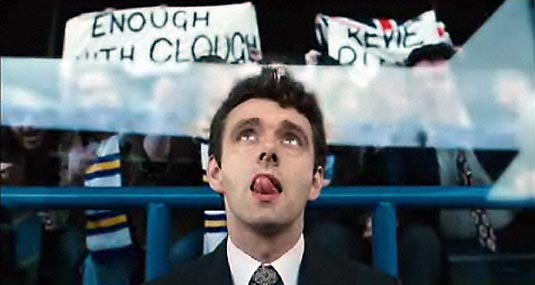

Director: David Yates, 2010. (PG-13)
"These are dark times, there is no denying. Our world has perhaps faced no greater threat than it does today." The opening words from Rufus Scrimgeour (Bill Nighy), the Minister of Magic, set the tone and mood for this film. And it is indeed darker, scarier and more mature than any in this franchise so far.
In making a film of the final book in the Harry Potter series the producers had a difficult decision to make: to sharply reduce the almost 800 pages into one epic film, even if it were 3+ hours of run-time, omitting much of the dense narrative and characters; or to keep the story intact but divide it into two films. They chose the latter, which moved the bogey to David Yates. His problem was how to make a middle movie that has no real conclusion, little action and lots of character development. But he has done a surprisingly fine job here.
Yates imbues the film with a profound sense of doom and despair, isolation and loss. From the darkness of the opening scenes to the bleakness of the broody English countryside, this is a moody and atmospheric film. This is a world at war.
 Despite the war, though, there is a lack of action sequences. What there are, are certainly done well. The opening sequence where Harry (Daniel Radcliffe) must be carried to safety by the members of the Order of the Phoenix, with volunteers morphing into multiple Harrys thanks to polyjuice, is thrilling. The ensuing aerial dogfight is reminiscent of Battle of Britain movies. There is a nail-bitingly suspenseful scene where Harry and Hermione (Emma Watson) visit Cedric's Hollow and face one of Voldemort's slithering serpents. And Ron (Rupert Grint) must face the horrors of one piece of Voldemort's soul while being psychologically battered by sensual visions of Harry and Hermione. But these sequences notwithstanding, the film is about character not commotion.
Despite the war, though, there is a lack of action sequences. What there are, are certainly done well. The opening sequence where Harry (Daniel Radcliffe) must be carried to safety by the members of the Order of the Phoenix, with volunteers morphing into multiple Harrys thanks to polyjuice, is thrilling. The ensuing aerial dogfight is reminiscent of Battle of Britain movies. There is a nail-bitingly suspenseful scene where Harry and Hermione (Emma Watson) visit Cedric's Hollow and face one of Voldemort's slithering serpents. And Ron (Rupert Grint) must face the horrors of one piece of Voldemort's soul while being psychologically battered by sensual visions of Harry and Hermione. But these sequences notwithstanding, the film is about character not commotion.Unlike the earlier films, there is no trip to Hogwarts. So the film is not structured around the semester schedule of magical studies. Further, few of the teachers from the school show up, and those that do, such as Mad-Eye Moody (Brendan Gleeson) and Severus Snape (Alan Rickman), have little more than cameo appearances. But Dobby the house elf does appear again for a key purpose.
With Voldemort (Ralph Fiennes) on the ascendance since the death of Dumbledore at the end of Half-Blood Prince, the order of the Phoenix has gone into hiding. Theirs is now a war of resistance, like much of occupied Europe in the 1940s. As he takes over the Ministry of Magic, putting his puppet minister in charge, there is a Nazi-like atmosphere prevailing, with ministry workers being pulled away for any excuse to suffer interrogation and Gestapo-esque torture.
When a momentary break in the tension via a wedding celebration is destroyed by the appearance of Death Eaters, Harry, Hermione and Ron leave all their friends to depart on a mission: to find and destroy the horcruxes. As readers of the book will know, these are objects that Voldemort chose to hide pieces of his dark soul. Difficult as they are to find, they are even more difficult to destroy.
 The extended sequences of the three heroes wandering the English countryside or sitting in their magical tent, give them time to show their acting chops. They have come a long way since the first film in 2001. Here they have the chance to communicate the dark night of the soul. As they undertake horcrux-searching, they experience soul-searching and deep angst. As the characters themselves have matured under author J.K Rowling's pen, these actors have matured enough to be able to carry this task on their broader shoulders.
The extended sequences of the three heroes wandering the English countryside or sitting in their magical tent, give them time to show their acting chops. They have come a long way since the first film in 2001. Here they have the chance to communicate the dark night of the soul. As they undertake horcrux-searching, they experience soul-searching and deep angst. As the characters themselves have matured under author J.K Rowling's pen, these actors have matured enough to be able to carry this task on their broader shoulders.Along the way, a strange symbol, comprised of a line and a triangle captured within a circle, keeps showing up. Only later does Luna Lovegood's father explain their meaning: "The Elder Wand [the line], the most powerful wand ever made. The Resurrection Stone [the circle]. The Cloak of Invisibility [the triangle]. Together, they make the Deathly Hallows. Together, they make one master of death." Using a clever animated sequence, Yates explains the backstory to these hallows which form the core of this final story.
 The final image of the movie shows Voldemort in a position of power, seeking to be master of death, holding his wand aloft. A powerful picture, it underscores the utter lack of hope in this film. Where almost all the previous Potter movies had hope of a savior as an interwoven theme, this is devoid of such.
The final image of the movie shows Voldemort in a position of power, seeking to be master of death, holding his wand aloft. A powerful picture, it underscores the utter lack of hope in this film. Where almost all the previous Potter movies had hope of a savior as an interwoven theme, this is devoid of such.The one biblical parallel in this film derives from this final image. It reminded me of the apparent victory of Satan over Christ at the cross on Good Friday. When Jesus hung there and the day was turned dark, he breathed his last, "It is finished" and "with that, he bowed his head and gave up his spirit" (Jn. 19:30). The death of the Son of God gave promise to Satan that his victory was secure and his reign about to begin. A dark night of the soul it was indeed for Jesus disciples as they hung their heads and hid behind locked doors in Jerusalem. They had to wait two long days, believing their Savior dead and gone. Resurrection and hope was a long way off. It is here, too.
We must wait almost 8 months, not two days, to experience the hope of final victory over Voldemort. Meanwhile, we can experience true victory by choosing to follow Jesus, because in doing so his spirit will come to live in us (Jn. 14:15-16). When that is the case, "the one who is in you is greater than the one who is in the world" (1 Jn. 4:4).
Copyright ©2010, Martin Baggs




 With this backdrop, the film moves to 1943, and David appears back in the village, a furtive fugitive, a skeletal image of the wealthy man he once was. Josef faces a choice and makes the snap decision to bring him home, to hide him in the secret room behind the closet. The problem is that Horst continues to drop in unannounced to flirt with Marie. As a "good citizen of the Third Reich" Horst cannot be denied this, and both Josef and Marie understand.
With this backdrop, the film moves to 1943, and David appears back in the village, a furtive fugitive, a skeletal image of the wealthy man he once was. Josef faces a choice and makes the snap decision to bring him home, to hide him in the secret room behind the closet. The problem is that Horst continues to drop in unannounced to flirt with Marie. As a "good citizen of the Third Reich" Horst cannot be denied this, and both Josef and Marie understand. Josef's willingness to take on this role makes him a pariah. Like the lepers of old, his neighbors avoided him, treating him with disdain. Are we ready to sacrifice reputation and more if it would save the life of another? Or would we push the person aside, expecting someone else to help, as the priest and the Levite did in Jesus' parable of the "Good Samaritan" (Lk. 10:25-37)?
Josef's willingness to take on this role makes him a pariah. Like the lepers of old, his neighbors avoided him, treating him with disdain. Are we ready to sacrifice reputation and more if it would save the life of another? Or would we push the person aside, expecting someone else to help, as the priest and the Levite did in Jesus' parable of the "Good Samaritan" (Lk. 10:25-37)?


 This brings up one of the themes present in the movie: the legacy of a family name. The elder Bush is concerned that his family leave a legacy for future generations, and a good one at that. We all want to be remembered for something good. Poppy was no different, although he was a president and a successful patriarch. David, in the Old Testament, a patriarch and king wanted this for his family. Although most of his children and decendants turned away from his faith and were disappointments, one came as the Messiah. David's legacy was legendary. How is yours?
This brings up one of the themes present in the movie: the legacy of a family name. The elder Bush is concerned that his family leave a legacy for future generations, and a good one at that. We all want to be remembered for something good. Poppy was no different, although he was a president and a successful patriarch. David, in the Old Testament, a patriarch and king wanted this for his family. Although most of his children and decendants turned away from his faith and were disappointments, one came as the Messiah. David's legacy was legendary. How is yours? In the other storyline, Bush is surrounded by a cadre of political advisors. Here the film sizzles with outstanding actors. Jeffrey Wright is Colin Powell; Scott Glenn (
In the other storyline, Bush is surrounded by a cadre of political advisors. Here the film sizzles with outstanding actors. Jeffrey Wright is Colin Powell; Scott Glenn ( Approval is one thing, disappointment is another. Rather than approval, Bush junior feels the disappointment that oozes from his father. Several times, Poppy verbalizes this to his son. How tough is that, for a man to know he is a disappointment to his father? As fathers, we must realize how fragile our sons' pysches can be. And if we are disappointed with them, we should determine how we can help them rather than hurt them even more. Poppy thought he was helping with his behind-the-scenes manouverings, and they did help politically. But what W. wanted more than anything was to hear his father say he loved him and was proud of him. Have we told our sons this lately? If not, why not do so today?
Approval is one thing, disappointment is another. Rather than approval, Bush junior feels the disappointment that oozes from his father. Several times, Poppy verbalizes this to his son. How tough is that, for a man to know he is a disappointment to his father? As fathers, we must realize how fragile our sons' pysches can be. And if we are disappointed with them, we should determine how we can help them rather than hurt them even more. Poppy thought he was helping with his behind-the-scenes manouverings, and they did help politically. But what W. wanted more than anything was to hear his father say he loved him and was proud of him. Have we told our sons this lately? If not, why not do so today? In the backstory of Bush's political emergence, we see him come to Christ. In a low-key scene, W. professes faith in Jesus. This is something his father does not understand or really acknowledge. Later, W. tells his pastor that he feels the Lord is leading him to be president. Although we see him as President concluding meetings with silent prayer, it is not obvious that Christ is the person directing Bush. Instead, Karl Rove appears to be that person, orchestrating Bush's rise to power.
In the backstory of Bush's political emergence, we see him come to Christ. In a low-key scene, W. professes faith in Jesus. This is something his father does not understand or really acknowledge. Later, W. tells his pastor that he feels the Lord is leading him to be president. Although we see him as President concluding meetings with silent prayer, it is not obvious that Christ is the person directing Bush. Instead, Karl Rove appears to be that person, orchestrating Bush's rise to power.





 From here, Orlov escapes surprisingly from the hands of two experienced CIA agents. Salt herself is able to escape from the CIA locked interrogation cell, and then from the building despite a SWAT team ready to take her down. On the run, Salt avoids her friend and boss, as well as the chief US interrogator Peabody (Chiwetel Ejiofor). But her husband disappears and she has multiple threats to worry about.
From here, Orlov escapes surprisingly from the hands of two experienced CIA agents. Salt herself is able to escape from the CIA locked interrogation cell, and then from the building despite a SWAT team ready to take her down. On the run, Salt avoids her friend and boss, as well as the chief US interrogator Peabody (Chiwetel Ejiofor). But her husband disappears and she has multiple threats to worry about. Salt really touches on the question of identity. And it makes us reflect on the identity of those around us, as well as our own identity. We can look at people and see what they want us to see. We take at face value their claims of ancestry and pedigree. We don't think to question their veracity. But we don't really know. Are they lying, even a little. Perhaps their stories are spun to make them look better. Who are they? Can we really know, short of a thorough background check, which few of us will do?
Salt really touches on the question of identity. And it makes us reflect on the identity of those around us, as well as our own identity. We can look at people and see what they want us to see. We take at face value their claims of ancestry and pedigree. We don't think to question their veracity. But we don't really know. Are they lying, even a little. Perhaps their stories are spun to make them look better. Who are they? Can we really know, short of a thorough background check, which few of us will do?
















